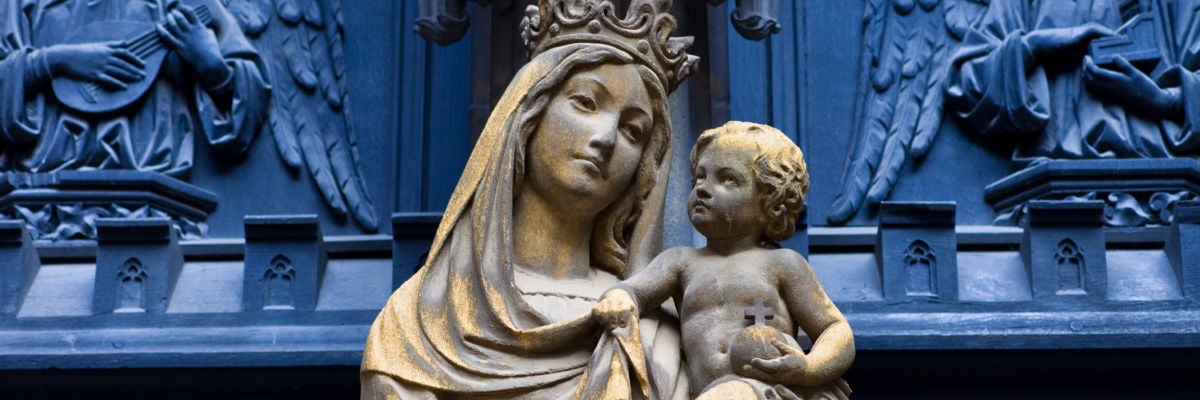A
anhphan
Guest
Nothing wrong with increasing my faith and love to God. Thank you.
Of course there’s nothing wrong with that. But may I humbly suggest that you can increase your faith and love to God even more by learning to trust the teachings of His Church more fully, especially the official dogmas of the Church.Nothing wrong with increasing my faith and love to God. Thank you.
I agree. It is neither a productive nor an efficient use of our time and energy, as laypersons, to ‘re-invent the wheel’ by going over and over issues that were resolved hundreds of years ago. Far better to trust the Magisterium and build from there by prayer and good works.anhphan:
Of course there’s nothing wrong with that. But may I humbly suggest that you can increase your faith and love to God even more by learning to trust the teachings of His Church more fully, especially the official dogmas of the Church.Nothing wrong with increasing my faith and love to God. Thank you.
One can think of dogmas as “settled theology”, truths that are contained in divine Revelation and have been promulgated by the Magisterium of the Church.
As far as I’m aware, early Protestants didn’t necessarily reject the Assumption. The near-universal rejection of it among modern-day Protestants seems to have been a later development. (That’s actually really standard when it comes to Marian dogma in general.)The Reformers and their legacy rejected what they thought were Roman Catholic corruptions. But perhaps they were ignorant of the fact that the Assumption is not just a Roman Christian belief
But may I humbly suggest that you can increase your faith and love to God even more by learning to trust the teachings of His Church more fully, especially the official dogmas of the Church.
I don’t really see an issue with asking these types of questions. Being inquisitive is not a sin. Even Mary herself displayed an inquisitive nature when she asked the angel how she could bear a child. For some, it could strengthen their faith, especially if they come a non-Catholic background where these beliefs are attacked, and you don’t get theologians or apologists by treating Catholicism as a place where we stop thinking because others already did that.It is neither a productive nor an efficient use of our time and energy, as laypersons, to ‘re-invent the wheel’ by going over and over issues that were resolved hundreds of years ago.
Seeking to understand the historical and theological background for the dogmas of the faith is not the same thing as questioning those dogmas.anhphan:
Of course there’s nothing wrong with that. But may I humbly suggest that you can increase your faith and love to God even more by learning to trust the teachings of His Church more fully, especially the official dogmas of the Church.Nothing wrong with increasing my faith and love to God. Thank you.
One can think of dogmas as “settled theology”, truths that are contained in divine Revelation and have been promulgated by the Magisterium of the Church.
I agree with this statement 100%. Reading the OP’s original question though, it seemed (to me at least) that she questioning how the Assumption of the Blessed Virgin Mary could be confirmed, hence be declared a dogma especially since it wasn’t mentioned in the Bible. In other words — to me — it sounds like she might have been questioning the dogma itself.PeterT:
Seeking to understand the historical and theological background for the dogmas of the faith is not the same thing as questioning those dogmas.anhphan:
Of course there’s nothing wrong with that. But may I humbly suggest that you can increase your faith and love to God even more by learning to trust the teachings of His Church more fully, especially the official dogmas of the Church.Nothing wrong with increasing my faith and love to God. Thank you.
One can think of dogmas as “settled theology”, truths that are contained in divine Revelation and have been promulgated by the Magisterium of the Church.
The Magisterium teaches it.I’m quite confussed and I don’t understand how Church can confirm the assumption of Mary. Can it be inferred in the Bible? Thank you very much.
yes, your right,this is an apt verse for the Assumption of Blessed Virgin Mary. thanksBehold my beloved speaketh to me: Arise, make haste, my love, my dove, my beautiful one, and come. For winter is now past, the rain is over and gone. Songs 2:10-11
Catholic theologians see the Ark of the Covenant as the most pure body of the most Blessed Virgin Mary.“Arise, O Lord, into your resting place: you and the ark, which you have sanctified” (Ps. 131:8)


